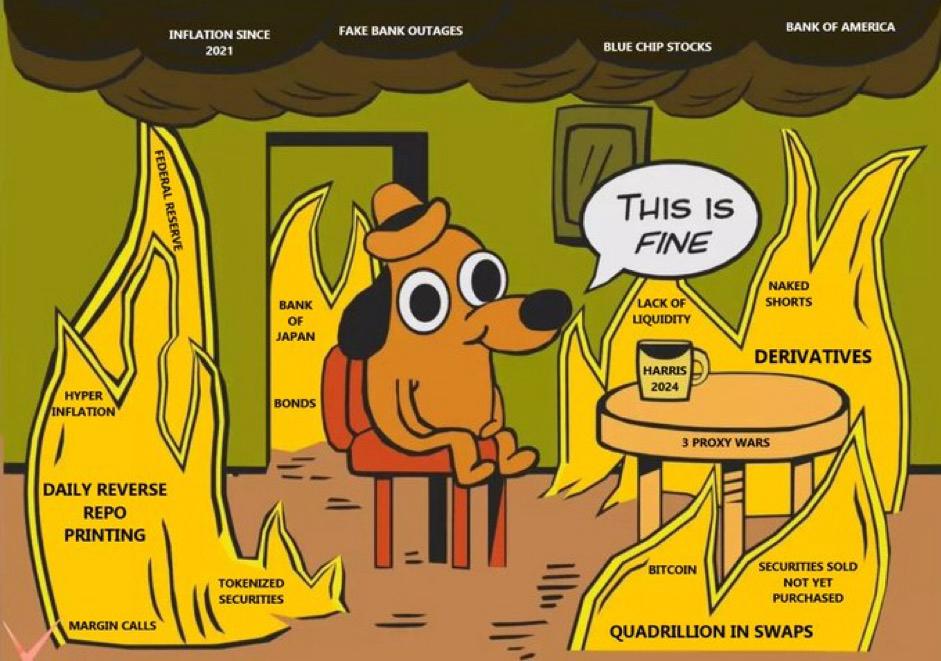
On Monday last week in my preview of FOMC and BOJ policy meetings “FED AND BOJ WILL DO EVERYTHING THEY CAN THIS WEEK TO SAVE THE STOCKS BUBBLE ONCE AGAIN” I assumed the BOJ would be cognizant of the overall situation, hence I saw zero possibilities they would have hiked rates. I was wrong; I trusted the BOJ too much, and I do not understand how I could have hoped for a spark of wisdom after they have consistently shown a lack of that for many decades. However, please have a look at what I expected would have happened if they hiked rates instead.
“A few hours before Jerome takes the stage, it will be BOJ’s turn to make sure nothing is going to spoil Jerome’s efforts. That’s why, on top of the many reasons I pointed out so far like here, or here, or here, as far as I am concerned I realistically see ZERO chances the BOJ will hike rates. Look at what happened to Japanese stocks in the past weeks since the latest intervention kicked off, do you think that a bit of (temporary) relief on the currency front while stocks crash is going to make the Japanese government happy? Of course not. And if this wasn’t enough, there is an even bigger problem, a further artificial strengthening of the JPY, made more acute by hedge fund liquidations, will force all those institutions flooded by margin calls on their carry trades to unwind, delivering a direct hit to foreign stocks, especially US stocks.”
As if that was not enough, I highlighted one more risk at the end of that article:
“As if the previous 2 points weren’t enough, raising Japan rates will consequently increase the cost of funding and liquidity problems for Japanese banks, potentially accelerating their reckoning with the mountain of losses hidden in their hold-to-maturity books (“NOT ONLY IS NORINCHUKIN ABOUT TO LIVE THROUGH THE 2008 NIGHTMARE AGAIN, BUT MANY JAPANESE BANKS ARE IN THE SAME SITUATION”).”
Now, in the same way it was not difficult to predict what would have happened to markets if the BOJ went for a rate hike, it is not that difficult to understand what it takes to stabilize the current situation either.
First of all, the BOJ must cut rates back to zero. Yes, not back to 0.10% where they stood till Tuesday of last week, but zero. Why? Because they need to compensate for the incredible damage suffered by its banking system and global markets in the past 7 days. As a consequence, just restoring the previous status quo won’t be enough, particularly after you showed the whole world how incredibly fragile and dependent on endless money printing to stay afloat your financial system is. Furthermore, as I have written about so many times to the point I get nausea now thinking about it, with the highest Debt/GDP ratio in the world, Japan is simply in no condition whatsoever to withstand a nominal increase in the cost of funding of its debt that will require more money printing to pay for it, accelerating the speed at which the country is mutating into a “Japanzuela”.
Will a “shocking” rate cut be enough? Of course not. That will stop the bleeding, but the body needs a big liquidity transfusion to quickly regain its vital functions. What am I alluding to?
Following up to my article “DID A CREDIT EVENT TRIGGER ON MONDAY? THERE IS A GOOD CHANCE TO KNOW THE ANSWER IN THE FOLLOWING HOURS” I calculated that, as a result of Monday’s crash in Japan, there is a settlement imbalance for up to ~$800bn in the Japanese system. Full details in the post here. Yes, I know that there will be netting at clearing to consider and perhaps even OTC agreements between brokers for a longer settlement between them than the customary one, but still, the ultimate sum will remain a very big amount of money to deal with, right?
What do you think is more likely at this point?
Option 1: The brokers and traders who were wise and managed to score big profits and/or limit their losses on Monday will be happy to cancel those trades, helping out their competitors that are instead deep underwater.
Option 2: The brokers and traders who were caught badly off guard on Monday and panic-sold at a steep loss now have a significant capital deficiency (because losses directly hit the capital base) and are begging the BOJ to hand them over cash to stay afloat and hide those losses away from the public eye.
“One very peculiar thing about the 1987 crash is that many brokerages went bust. So how is it possible that Japan suffered a stock market crash of a magnitude never experienced before, not even in 1987, and no damage has been reported so far among its major market participants?”
Unless you still believe in unicorns or Santa, after 24 hours I posed the question above first, we can say that it is literally impossible that not even a little brokerage house based in the outskirts of a remote island of the Japan archipelago suffered big losses on Monday. All the BOJ has been doing till now is to “extend and pretend” everything is normal, there is nothing to worry about, look away please there is nothing to see here but some nice cherry trees, amazing food, and ancient temples. Jawboning works well in the age of algorithmic trading based on headline feeds from MSM that are just a megaphone for whatever the policymakers feed them with, but clearly as soon as the human brain processes that things do not make sense and starts reacting logically, the “Jawboning relief” fades as quickly as it came.
What is the BOJ risking if they take too long to act? As soon as the smell of someone in trouble starts spreading, but it is unclear where it comes from, one thing the GFC taught everyone is that as soon as financial institutions start doubting each other’s solvency, they significantly scale back their exposure to every counterpart in the market that at that point can come close to a halt because of lack of liquidity and willing operators to transact since they do not know whether their counterpart will be there the following day to settle its trading obligations.
Of course, cutting back rates to zero and gearing up the money printer as if there is no tomorrow again will be of incredible damage to the BOJ’s reputation, but what’s the alternative? Letting banks implode “to save face”? Will that be an even bigger problem for the country and its government to deal with when they are already struggling to make ends meet in public finances?
To conclude, Japan enjoyed having its cake and eating it too for a very, very long time, but dreams cannot last forever since sooner or later a person has to wake up and live in the real world. Unless it is in a stage of unrecoverable coma, in that case, sadly there is not much that can be done to steer Japan away from the road to becoming a “Japanzuela” zombie.
